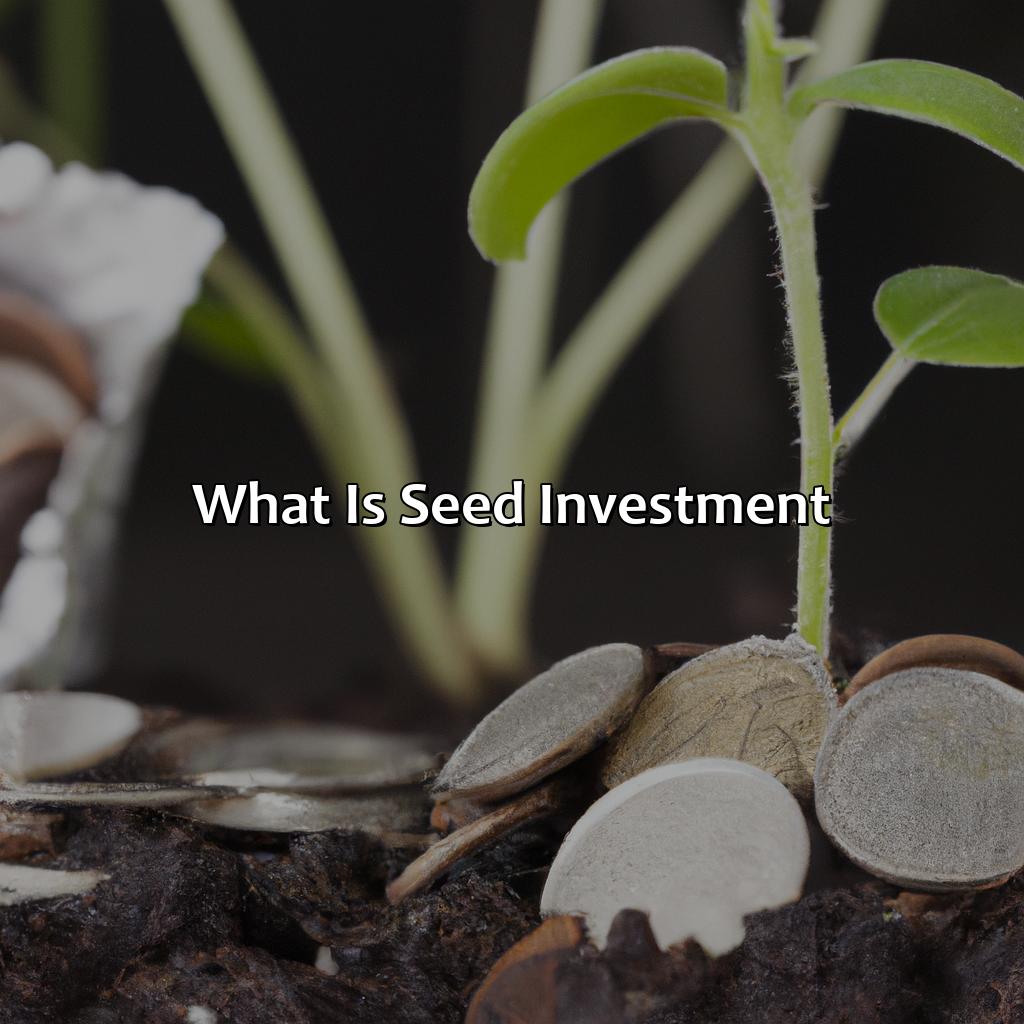What Is Seed Investment?
Key Takeaway:
- Seed investment is an early stage investment made in a startup before it has established a track record. It usually helps startups fund their initial operation costs including product development, market research, and recruitment.
- Seed investment is crucial for startups as it helps them to move from just an idea to a functioning product. It also allows early investors to take an equity stake in the company and potentially reap high returns when the company grows and becomes profitable.
- The process of seed investment involves identifying potential startups, evaluating their potential, and funding the right companies. The process of seed investment is risky as not all startups will succeed, but those that do can yield high rewards for investors.
1. Seed investment is an early stage investment made in a startup before it has established a track record. It usually helps startups fund their initial operation costs including product development, market research, and recruitment.
2. Seed investment is crucial for startups as it helps them to move from just an idea to a functioning product. It also allows early investors to take an equity stake in the company and potentially reap high returns when the company grows and becomes profitable.
3. The process of seed investment involves identifying potential startups, evaluating their potential, and funding the right companies. The process of seed investment is risky as not all startups will succeed, but those that do can yield high rewards for investors.
Are you curious to know what seed investment is and how it can help you be a successful entrepreneur? Seed investment is an important capital injection to get your business off the ground and this article will explain the basics in detail. You’ll gain an insight into seed investment and the benefits it can offer you.
What is seed investment?
Let’s look at seed investment and why it’s important! Firstly, let’s define it. After that, we’ll examine its importance. That way, you can see how it fits into the world of startup financing.
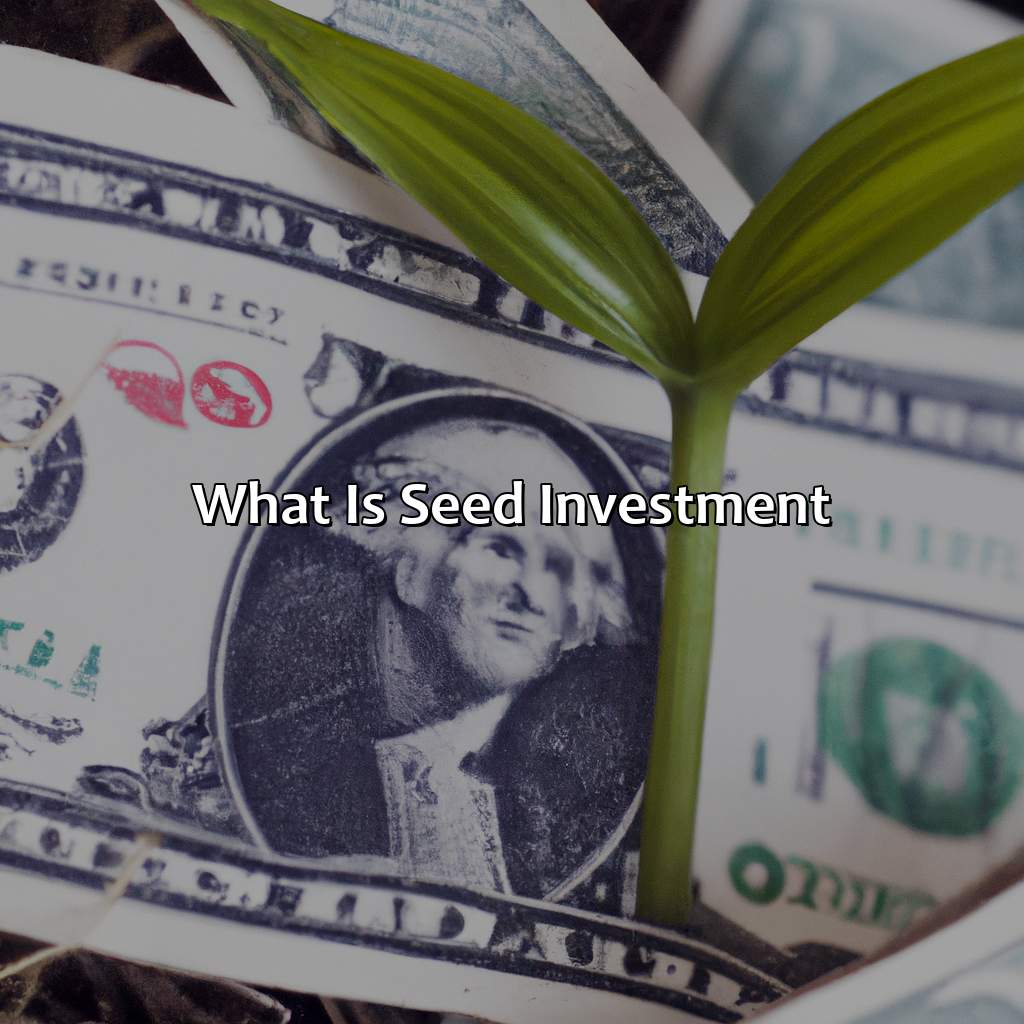
Image credits: retiregenz.com by James Jones
Definition of seed investment
Seed investment refers to the initial capital that a startup business requires to get off the ground. This form of investment targets early-stage companies with high growth potential and is typically provided by angel investors or venture capitalists.
Seed investment allows startups to develop their products and services, conduct market research, and hire employees. Aside from providing financial assistance, seed investors also offer guidance and mentorship to help shape the direction of the company. They may also provide access to valuable networks, thus increasing the startup’s chances of success.
It’s worth noting that seed investments may come with some risks, as startups are in their early stages where there is no track record for performance. It’s important for both parties involved to have a clear understanding of expectations, risk sharing, and equity ownership.
It’s advisable for startups seeking seed investment to have a solid business plan and consider factors such as customer demand, competitive landscape, marketing strategy, scalability potential and cash flow projections. The process can be time-consuming but having a strong pitch deck can greatly increase chances of securing funding.
In summary, seed investment provides early stage businesses with necessary capital infusion plus valuable resources that contribute towards their success. Seed investment is like planting a tiny seed that has the potential to grow into a money tree, but with less dirt and more paperwork.
Importance of seed investment
Comprehending and investing in seed-stage companies are crucial for economic growth and enhancing the startup ecosystem. Seed investment provides funds to early-stage firms to develop their MVPs (minimum viable products), refine business models, and create market-ready products/services, which further encourage entrepreneurship.
Seed investment helps startups by mitigating financial risks, bolstering innovative technologies, expanding professional networks, augmenting customer bases and eventually upscaling businesses. Investing at this stage may prove beneficial in generating high returns. Seed investment is vital for boosting innovation, job creation, wealth distribution, and transforming economies.
Investors should inquire about startups’ potential market value, product differentiation from rivals and conduct thorough background checks before extending invitations to invest. Successful seed investments can propel long-lasting community impact.
Not too long ago, a mechanical engineer with a passion for robotics initiated his robotics start-up aided by a seed fund that boosted his early idea into a full-fledged venture; within five years of inception, his firm premiered on the stock exchange board generating millions in revenue striking glamour titles as “robotics leader.”
Plant the seed, water it with cash, watch it grow into a thriving business – that’s the process of seed investment.
Process of Seed Investment
- Grasping seed investment with potential startups is an exciting journey.
- Picking out the potential startups is key.
- After that, assess if they are good for seed investment.
- Lastly, give the chosen startup the needed funding.
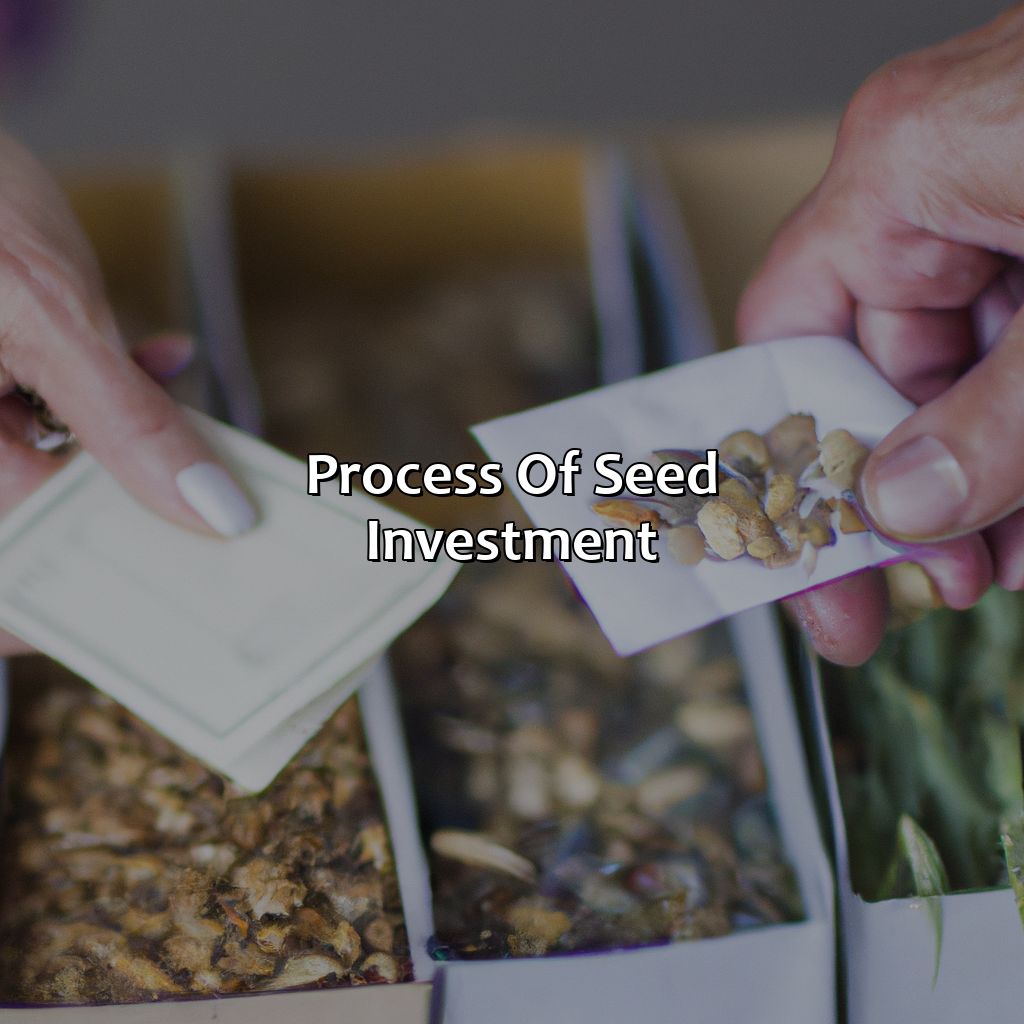
Image credits: retiregenz.com by James Duncun
Identifying potential startups
Discovering Potential Startups in the Seed Investment Process
Identifying startups with potential is vital to seed investment. Analyzing the founders, their experiences, and passions can help determine if they are suitable contenders for investment. Apart from lifestyle, customer pain points and solutions unique to each startup must also be evaluated.
Furthermore, ascertaining if possible investments align with investors’ values is crucial. Thereafter, appropriate action can be taken to improve the profitability of the startup.
It is vital to note that researching startups before making any initial contact increases the chances of success. Profiling a target market can aid in identifying emerging trends/the particularities within that industry; thus allowing investors to partner with well-suited startups.
To optimize results, attending pitch events held frequently for entrepreneurs happens to be beneficial. Such platforms bring together amateurs seeking funding in one spot whilst exposing what others are offering while communicating a business idea’s potential revenue at the same time.
Finding the diamond in the rough of startup pitches is like searching for a needle in a haystack, except the haystack is made of buzzwords and the needle is actually a viable business idea.
Evaluating startups for seed investment
For seed investment, scrutinizing startups is a vital process. To begin with, this evaluation involves assessing the team’s competence, analyzing their unique selling proposition (USP), and identifying market demand. Furthermore, it includes analyzing financial statements and performance projections to discern growth potential. Startups that show potential for growth get considered for seed investment.
When evaluating startups for seed investment, investors typically look beyond financials. Some essential factors to evaluate are the founder mindset and approach towards innovation and problem-solving methods employed. Additionally, factors like customer retention rates, competition landscape, target market size and scalability play a crucial role in determining whether a startup is viable or not.
Evaluating startups for seed investment requires an analytical mindset to filter good from bad investments by identifying prospective ideas that have long-term viability prospects. It also includes building relations with entrepreneurs early on and creating high-quality deal flows by networking within accelerator/incubator communities.
In South Africa, Jumia Nigeria’s founder Tunde Kehinde launched Lidya – a digital platform specifically aimed at providing small business loans quickly while bypassing traditional paperwork-based lending policies- received over $6 million in seed capital due to the startup’s unparalleled success with Nigerian businesses struggling for financing options.
Money may not grow on trees, but with seed investment, you can cultivate your startup dreams into reality.
Funding the startup
A startup can secure financial backing during its inception through early-stage funding, referred to as seed investment. It involves providing capital to promising startups with innovative business models and high growth potential, at a very nascent stage. Seed investors may be individuals or venture firms willing to make equity investments in exchange for an ownership stake in the company. Typically, the investment ranges from $25,000 to $3 million, depending on the stage of development and industry of the startup.
The seed investment process follows a series of steps that typically include:
- sourcing new opportunities,
- screening them based on predetermined criteria such as market size and technology uniqueness,
- conducting due diligence on selected startups and their management teams,
- negotiating deal terms with the founders and other investors if applicable before finally closing the deal.
For seed-stage firms without a track record or proof of concept in place – investor inclination towards unique intellectual property (such as proprietary technology) is often regarded higher; while being first to market is important for those operating within established industries.
Startups must scrutinize their sources of capital carefully because seed investments are crucial elements for remaining viable beyond their initial stages. They should also thoroughly assess potential partners’ experience and networks since they assist businesses with strategic decision-making by linking them up with potential co-founders or collaborators.
Pro Tip: Engage in building relationships with investors prior to seeking funding so that discussions feel less transactional – build trust to ensure more favorable outcomes during negotiations.
Seed investment is like playing the lottery, with a slightly higher chance of getting rich and a significantly higher chance of losing your shirt.
Risks and Rewards of Seed Investment
Delve into the sub-sections of seed investment to comprehend the risks and rewards. By doing this, you may discover the potential drawbacks of this investment. Also, you could unlock the potential for high returns and involvement in innovative businesses that seed investment can offer.
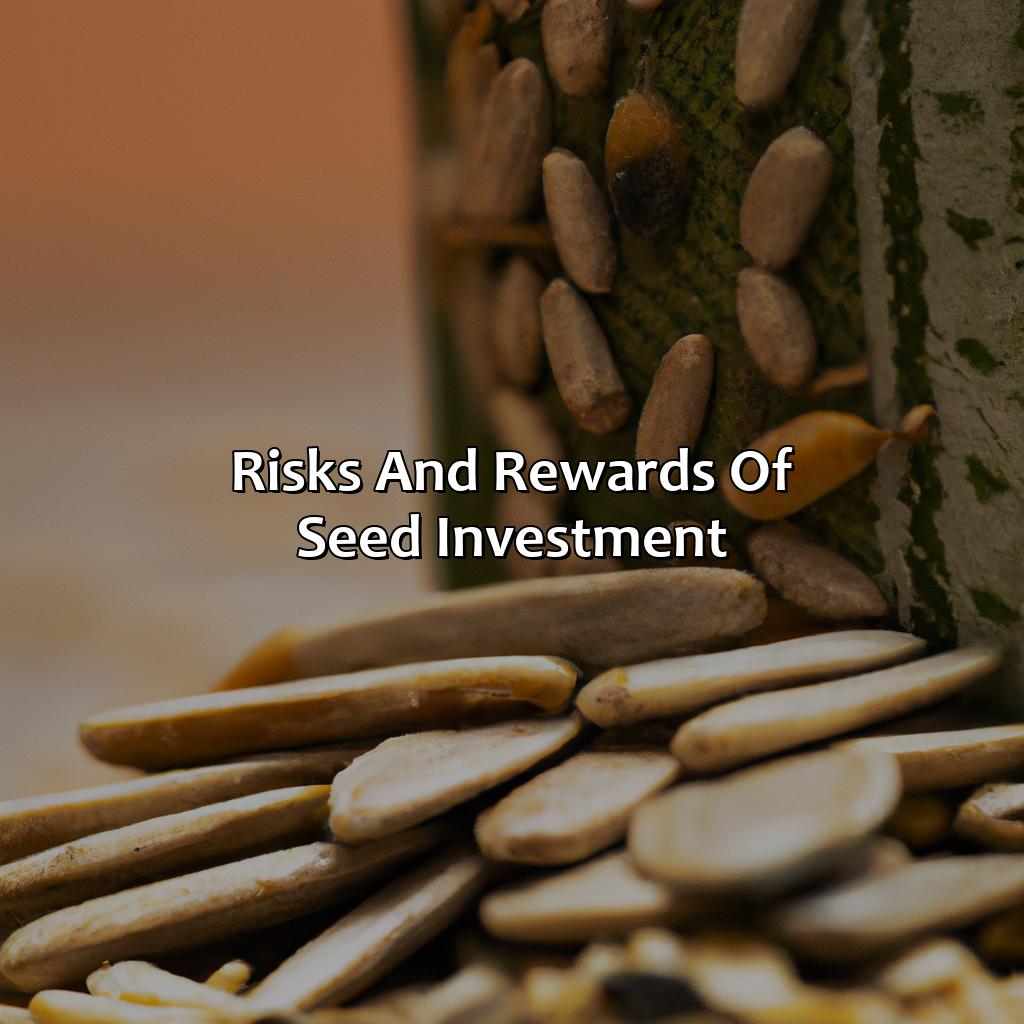
Image credits: retiregenz.com by James Washington
Risks involved in seed investment
Seed investment is an indispensable way to fund a startup business. However, investments always come with risks. When it comes to Seed Investment, various complexities and uncertainties come into existence that investors should be aware of.
- Market Risks: A new product or concept can either make or break the market. If the product doesn’t meet customer expectations, there may be little demand, which causes failure.
- Execution Risks: Companies need to execute their plans correctly. Development strategies must hit the mark to transform innovative concepts into real-world business successes.
- Financial Risks: It is imperative to manage cash flow effectively. A lack of stability in cash flow will significantly increase the difficulty level for delivering a bottom-line return.
- Dilution Risk: Additional financing could lead to losing control over shares held by existing shareholders as they’re diluted with a decrease in ownership percentage.
- Regulatory and Legal Risks: Operating within the law of governing bodies is essential since regulations and legal aspects vary from country to country and may drastically influence a startup’s direction.
One of the most significant risks in seed investment deals with vying against more prominent competitors who have already made their name in similarly themed markets through smooth marketing campaigns or vast customer exposure.
Investors should consider mitigating potential risks by using due diligence when assessing potential investment opportunities before investing. One can further protect their investments by utilizing legal arrangements for obtaining equity, convertible debt or SAFE notes agreements at the initial stages.
Plant the seeds of investment early and reap the rewards later, just don’t forget to water them with due diligence and patience.
Rewards of seed investment
Investing in the early stages of a startup can reap substantial returns in the long run. Here are six possible rewards of seed investment:
- Potentially high ROI with shares at lower prices.
- Access to a new market with high growth potential.
- Opportunity to be an influential figure in a successful company’s formative stages.
- Diversification of risk by investing in multiple ventures.
- The satisfaction of backing entrepreneurs who turn their innovative ideas into successful businesses.
- Chance to make impactful decisions that shape a company’s direction and culture
By taking advantage of seed investment opportunities, investors can also gain access to industry trends and emerging technologies, giving them an edge on competitors.
In order to maximize the rewards of seed investments, it is recommended that investors conduct thorough due diligence on startups before making any financial commitments. Staying updated on industry news and events can also provide valuable insight for decision-making. Additionally, it is crucial for investors to maintain open lines of communication with startup founders and stakeholders.
Overall, seed investment holds the potential for significant monetary as well as non-financial rewards. Done carefully and thoughtfully, it can be a profitable method for diversifying portfolios while contributing to innovation and entrepreneurship.
Planting a seed of investment can reap a bountiful harvest of success, just ask the founders of Airbnb, Uber, and Dropbox.
Examples of Successful Seed Investment
Discover how seed investment works by examining the success stories of companies funded this way. This section on ‘Examples of Successful Seed Investment’ will lead you through real-life businesses which achieved great success after receiving seed money.
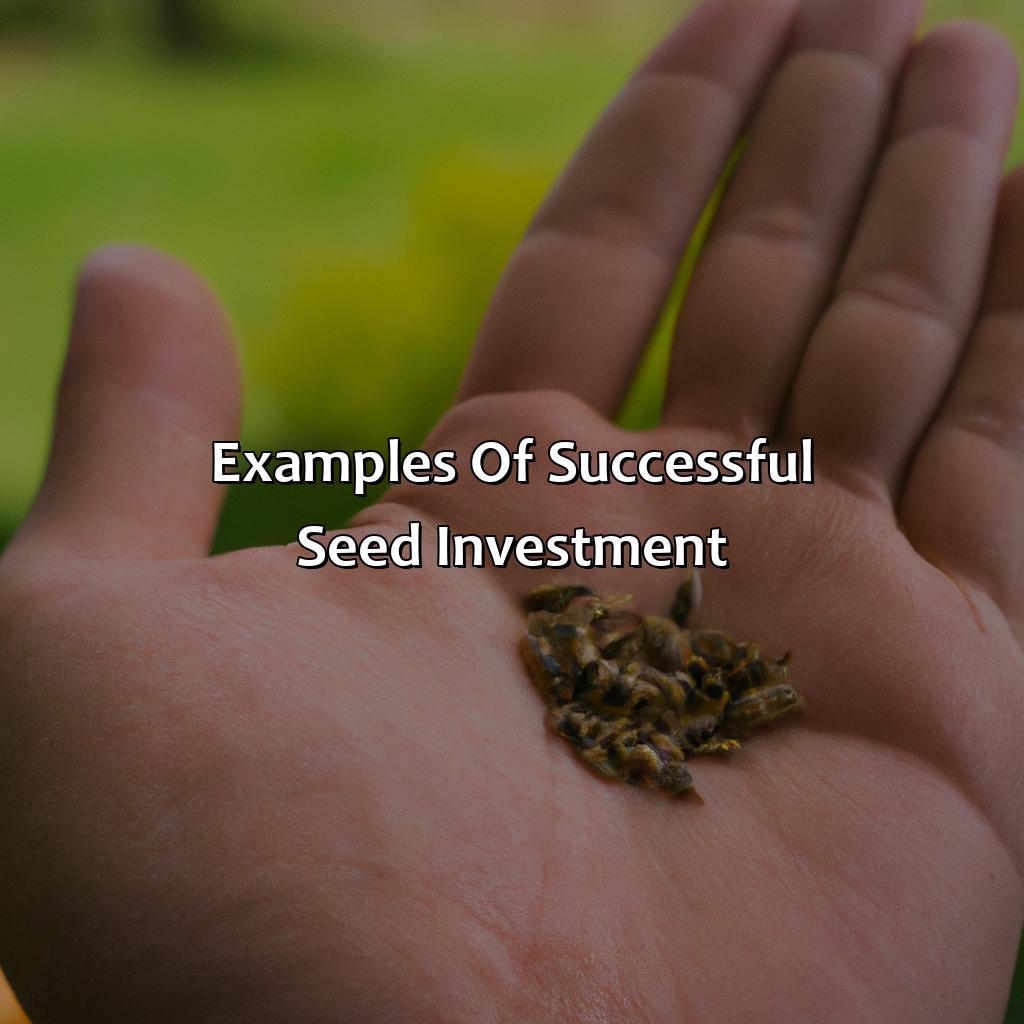
Image credits: retiregenz.com by David Duncun
Companies funded by seed investment
Seed investment has helped numerous startups to turn their ideas into successful companies. Here are six examples of companies funded by seed investments:
- Uber – Seed investment from First Round Capital, Lowercase Capital and others helped Uber establish as a ride-hailing giant.
- Dollar Shave Club – Seed funding from Kleiner Perkins Caufield & Byers helped Dollar Shave Club revolutionize the men’s grooming industry.
- Instagram – Seed investment from Baseline Ventures, Andreessen Horowitz, and others played a crucial role in Instagram’s success as one of the most popular social media platforms.
- Zynga – Seed funding from Avalon Ventures and Foundry Group enabled Zynga to become a leading mobile gaming company.
- Dropbox – Seed investment from Sequoia Capital and Y Combinator helped Dropbox to become the world’s leading cloud storage provider.
- Airbnb – Seed funding from Y Combinator paved the way for Airbnb to disrupt the hospitality industry with its innovative business model.
Apart from financial support, seed investors also provide valuable guidance and mentorship to startups. They help startups refine their business plans, develop strategies for growth, connect them with relevant industry contacts, and more.
Missing out on seed investment opportunities like these could result in lost opportunities for lucrative returns on your investment. So don’t hesitate to explore potential investments in promising early-stage startups.
From tiny acorns, mighty oaks grow: these seed investment success stories prove that sometimes all it takes is a little nurturing to reap big rewards.
Success stories of seed investment
Investing in a fledgling startup can be risky, yet the lure of discovering the next Airbnb or Uber keeps entrepreneurs coming back for more. Let’s explore some instances where seed investment has given young firms a boost.
For instance, Backlinko was just another SEO blog until lead entrepreneur Brian Dean received $10,000 worth of seed funding from his friend. With this money, he hired content writers and began producing content that was highly valuable to his audience. Today, Backlinko has developed into a seven-figure business that reaches millions of people worldwide.
Another success story is that of Hopper, which revolutionized the travel industry with its flight booking search engine. Hopper managed to raise $8 million in seeds funding back in 2013 when it was still an idea on paper – and within two years it had generated over $15 million in revenue.
What’s fascinating about these examples is that they relied heavily on funding at an early stage – without it, they might never have taken off. If you’re an investor contemplating the merits of seeding cash into a startup, consider giving them a chance – You may regret passing up the opportunity if you don’t! Seeding your investment wisely can lead to a fruitful harvest, but don’t forget to water it with research and due diligence.
Recap of seed investment
The essence of the initial funding round into a promising project or start-up is known as the Seed Investment. It is often provided by angel investors, venture capitalists or family and friends who wish to support the budding entrepreneur’s idea in its nascent stages.
Seed investment usually functions as an injection of capital allowing for essential activities such as market research, product development and hiring personnel. The seed stage is primarily concerned with transforming these ideas into a working prototype or minimum viable product. This stage also requires comprehensive due diligence to minimize risk while maximizing returns.
One of the primary features of seed investment is that it typically comes with fewer strings attached, and the investor is often comfortable aiding a yet unproven concept for equity in return. Start-up companies often face significant struggles at this stage to convince established investors due to their lack of track records and limited early-stage revenues.
Seed investments have been critical to companies like Airbnb, Dropbox and Instagram, which relied on funding when their concepts were still in their infancy. Today, they are estimated to be worth billions of dollars each.
Final thoughts on seed investment.
Seed financing is an early-stage investment that funds business ventures to take their initial steps towards success by covering their costs and expenses. Seed investments give startups the financial, strategic, and mentorship resources necessary to grow into successful businesses in the future.
When it comes to seed investment, various investors such as angel investors, venture capitalists, and crowdfunding platforms play a crucial role in providing funding for startups. They evaluate multiple factors such as team competence, market opportunities, potential scalability, and unique selling points before investing.
However, the key takeaway for entrepreneurs seeking seed investments is that they need to have a clear understanding of how to pitch their idea or product effectively, establish rapport with investors and showcase their startup’s growth potential.
In addition to capital injection that seed rounds provide, startups could also gain from exposure to incredible mentors and networks that many seed investors possess. These seasoned mentors can guide a startup through the chaotic process of building up a fledgling company. For instance, ZoomFox was a successful startup seeded by Peter Thiel after giving a three-minute pitch at Harvard University.
All entrepreneurs must understand how vital these initial phases are since they set the foundation for startups’ long-term success.
Five Facts About Seed Investment:
- ✅ Seed investment is the earliest stage of investing in a startup, typically done by angel investors, venture capitalists, or incubators. (Source: Investopedia)
- ✅ Seed investment is used to fund the company’s initial operations, research and development, and product testing. (Source: Forbes)
- ✅ The average seed investment round ranges from $10,000 to $2 million, depending on the industry and the company’s needs. (Source: TechCrunch)
- ✅ Seed investments are typically made in exchange for equity or convertible debt, giving investors a stake in the company and the potential for a high return on investment. (Source: AngelList)
- ✅ Successful seed investments can lead to further rounds of funding and eventual growth of the startup into a successful business. (Source: Small Business Trends)
FAQs about What Is Seed Investment?
What is seed investment?
Seed investment is the initial funding for a startup or new business venture. It typically comes from friends and family, angel investors, or venture capitalists who are looking to invest in promising ideas or concepts.
What are the benefits of seed investment?
The benefits of seed investment include access to capital, the ability to fund early development of a product or service, and the potential for additional funding down the line. It also provides the opportunity to bring on experienced investors who can offer guidance and mentorship.
How much money is typically raised in a seed investment round?
The amount of money raised in a seed investment round can vary widely depending on the business and the investors involved. Typically, seed rounds range from $100,000 to $2 million, although some companies raise much more.
What is the difference between seed investment and venture capital?
Seed investment is the initial stage of funding for a startup or new business, while venture capital typically comes later in the growth phase when a company is more established. Additionally, seed investment often comes from individual investors or smaller firms, while venture capital is often provided by larger investment firms.
What is the typical equity or ownership stake for a seed investor?
The equity or ownership stake a seed investor receives in a company can vary widely, but it typically ranges from 10% to 30%. The exact percentage will depend on the amount of money invested, the valuation of the company, and other factors.
What are some common terms used in seed investment agreements?
Some common terms used in seed investment agreements include valuation, dilution, vesting, and anti-dilution protections. It is important for entrepreneurs and investors to have a clear understanding of these terms and how they will impact the business and its stakeholders.
